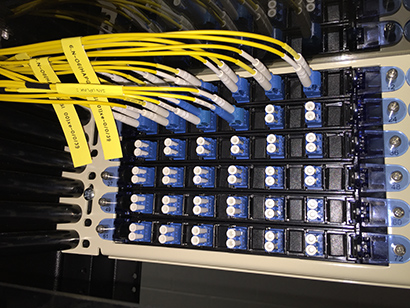University of Arkansas to Create Faster Network Connections to ARE-ON, Internet2

Fiber optic connections in the Arkansas High Performance Computing data center create the physical backbone of the University of Arkansas' campus network and allow the university to connect to the outside world.
FAYETTEVILLE, Ark. – The University of Arkansas will use a National Science Foundation grant to significantly upgrade its campus connection to the Arkansas Research and Education Optical Network, better known as ARE-ON, and to the Internet2 national research and education network.
The two-year, $496,948 grant will pay for equipment that will lead to much faster network connections for the University of Arkansas and for 35 other universities, colleges, two-year institutions and educational affiliates that are served by ARE-ON.
The network connections to the Internet2 research and education network for U of A will increase to 100 gigabits per second – 10 times the current capacity. The grant will also fund other equipment that will enable the use of next-generation Internet protocols and the development of a high-speed data transfer facility to support data-intensive research.
ARE-ON connects Arkansas to the Internet2 research network and a national fiber optic network for universities and research institutions with data speeds of up to 100 gigabits per second. That speed allows institutions to quickly trade large volumes of data, hold high-resolution video conferences and virtual classes, and connect to supercomputers that process and manage research-related projects.
“These upgrades will directly support research, research training and education at the University of Arkansas and a broad range of other educational institutions in Arkansas,” said Rick McMullen, principal investigator for the grant and director of the Arkansas High Performance Computing Center at the University of Arkansas. “Education programs we expect to support and further enable include life sciences education programs aimed at establishing STEM pipelines for students from underrepresented groups, bridging two- and four-year higher education institutions with research-intensive universities.”
The new network capabilities will enable a broad range of research efforts, including research in human and agricultural genetics and materials science powered by the Extreme Science and Engineering Discovery Environment, a collection of facilities that scientists can use to interactively share computing resources, data and expertise. The collected facilities, known as XSEDE, are supported by the National Science Foundation and offer researchers access to a network of 16 supercomputers and high-end visualization and data analysis resources across the United States.
The project, funded through NSF’s Advanced Cyberinfrastructure Division, will support the development and characterization of novel materials at the Institute for Nanoscience and Engineering at the University of Arkansas and will provide a technical framework for research, education and training in software-defined networking for the university and other institutions in the state. Software-defined networking is a new technology that allows the development of software that will be able to make dynamic changes to network flows.
“This new high speed connection removes technical roadblocks for our researchers and provides them with near frictionless access to regional and national research networks,” said David Bruce, associate chief information officer for campus networks at the U of A. “An increased network capacity to 100 gigabits per second will enable the university to join the ranks of other leading research universities in implementing the Internet2 Innovation Platform.”
The project also will provide connectivity to the Internet2’s Advanced Layer 2 Service with support for the communications protocol known as OpenFlow traffic between ARE-ON members and other Internet2 member institutions, and OpenFlow tagging and traffic management on the University of Arkansas, Fayetteville, and University of Arkansas at Little Rock campuses.
ARE-ON is governed by the presidents and chancellors of participating institutions, in cooperation with the Arkansas Department of Higher Education. The network’s offices are at the University of Arkansas.
“These enhancements to our cyber connectivity will have a profound and direct effect on all research and education efforts conducted at the University of Arkansas and other ARE-ON member institutions,” said Steven Fulkerson, executive director of ARE-ON. “By providing this advanced connectivity, ARE-ON continues to be a platform for innovation that will enable our research-intensive institutions to attract and retain top researchers from around the world.”
Contacts
Rick McMullen, director
Arkansas High Performance Computing Center
479-575-8681,
dfmcmull@uark.edu
David Bruce, associate chief information officer for campus networks
Information Technology Services
479-575-2426,
dbruce@uark.edu
Steven Fulkerson, executive director
Arkansas Research and Education Optical Network
479-575-5465,
steven.fulkerson@areon.net
Chris Branam, research communications writer/editor
University Relations
479-575-4737,
cwbranam@uark.edu
Headlines
Native American Student Association to Host Annual Choctaw Stickball Tournament
Competition begins at 10 a.m. Saturday the the University Recreation fields on Razorback Road. Carly Keats, a star Razorback basketball player, will play for her home team from Choctaw, Mississippi.
Department of Music Professor to Teach at Italian Festival in June
Richard Rulli, associate professor of trumpet in the Department of Music, has been invited to teach at TrumpetFest June 16-23 in Orvieto, Italy.
Bumpers College Names Senior Scholars, Outstanding Departmental Students
Twenty-five students from 10 different majors and concentrations in Bumpers College were named Senior Scholars for 2023-24, and each department has named its outstanding students for the year.
Music Education Students Bring Fun to Child Development Center
Interactive music sessions known as "music zoos" bring creative learning of musical instruments to the children in the center, as well as providing the music education students the chance to practice their teaching skills.
New Faculty Teaching Portfolio Authors Recognized
The faculty members successfully completed the Teaching Portfolio and will be recognized at the Fall Teaching Awards ceremony hosted by the Cordes Teaching and Faculty Support Center and the Teaching Academy.




